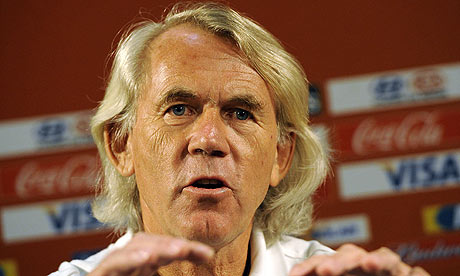Drug testing to start two months before tournament kick-off
• 576 players to be drug tested before and during World Cup

Jiri Dvorak, Fifa's chief medical officer, said vigorous drug testing will take place before and during the World Cup. Photograph: Stephane de Sakutin/AFP/Getty Images
Fifa threw down the gauntlet to drugs cheats when it announced out-of-competition blood and urine tests on 576 players before and during the World Cup.
Football's world governing body said its crackdown would start more than two months before the tournament kicks off in South Africa. The 32 finalists have been told to submit their team whereabouts to Fifa by 22 March. Without notice, eight players from each squad will be randomly selected during friendlies or training camps. Those tests will start on 10 April and run until 10 June, the day before the opening match of the World Cup.
Vigorous drug testing will also be carried out during the month-long competition, said Fifa's chief medical officer, Jiri Dvorak.
"Two months prior to the World Cup we will be visiting the teams unannounced," he told a press conference in Sun City, where Fifa concluded a three‑day medical conference today. "During the World Cup, two players from one team will be selected randomly after a match.
"We have a strict strategy to fight doping and we take the fight against doping very seriously and are committed to continuing it in full compliance with the Wada [World Anti-Doping Agency] code. The teams have confirmed their full compliance in this regard."
Dvorak said that 320 tests will be conducted before the tournament and at least 256 more after kick-off. He added that Fifa has conducted more than 33,000 doping tests over the years, with 0.03% returning positive results.
"We think that the individual in-competition and out-of-competition testing in football is really inefficient and ineffective. Random team testing of elite teams at any time offers a more deterring effect."
Earlier, concern was expressed that players could use undetectable stimulants derived from traditional African medicines that are not banned to gain an unfair advantage. South Africa's team doctor, Ntlopi Mogoru, said some plants, usually found in tropical African countries, could produce steroid byproducts that are not on Wada's list and are not picked up in doping tests. The Fifa medical committee chairman, Michel D'Hooghe, said he wanted Wada to consider some African plants for analysis.
Physicians representing all 32 finalists signed a joint declaration pledging their full support for Fifa's anti-doping strategy, as well as for the implementation of a pre-competition medical assessment (PCMA) to prevent injuries.
According to a Fifa statement, since 2006 the Fifa PCMA has been recommended as an effective means of detecting possible underlying cardiac diseases, helping to avoid tragedies such as the death of Marc-Vivien Foé during the 2003 Confederations Cup.
Victor Ramathesele, the 2010 local organising committee chief medical officer, said: "Together with the government we have to provide medical services to teams, players, and the fans at fan parks, and when they move around between the cities on match days. We also want to ensure that no one brings diseases to the country. We want people to enjoy themselves when they come here."
No comments:
Post a Comment